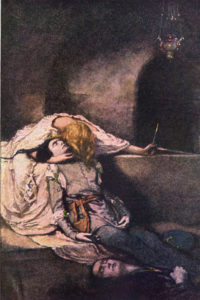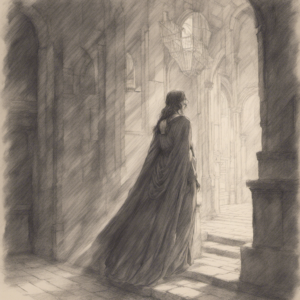While Romeo and Juliet is arguably Shakespeare’s most famous work, casual fans rarely know that few of Shakespeare’s plots were original. The tale of the star-cross’d lovers dates back at least to The Tragical History of Romeus and Juliet, by Arthur Brooke (1562). His, in turn, was based either on an Italian novella by Matteo Bandello, or a via a French translation of that novella (theories vary).

I’m not about to claim that we should teach Brooke to high school students. It’s hard enough to get Romeo and Juliet into their heads. But that doesn’t mean we can’t bring him into the conversation,. I was looking at Brooke’s text tonight to answer a different question, and I found this. I guess it’s his version of what Shakespeare turned into the famous prologue:
Love hath inflaméd twain by sudden sight,
And both do grant the thing that both desire
They wed in shrift by counsel of a friar.
Young Romeus climbs fair Juliet’s bower by night.
Three months he doth enjoy his chief delight.
By Tybalt’s rage provokéd unto ire,
He payeth death to Tybalt for his hire.
A banished man he ‘scapes by secret flight.
New marriage is offered to his wife.
She drinks a drink that seems to reave her breath:
They bury her that sleeping yet hath life.
Her husband hears the tidings of her death.
He drinks his bane. And she with Romeus’ knife,
When she awakes, herself, alas! she slay’th.
That … is a surprisingly good summary of the entire play. Much better than Shakespeare’s version. Let’s look:
- love at first sight
- They get married in secret.
- Romeus visits Juliet’s bedroom at night.
- They get three months of this (which Shakespeare took away!).
- Romeus gets Tybalt angry, ends up killing Tybalt, and is banished for his trouble.
- .They try to get Juliet to marry someone, but she fakes her death instead
- Romeus hears that she’s dead and poisons himself.
- Juliet kills herself with Romeus’ knife.
With a little editing love to modernize the spelling and a couple of glossary notes, you could give this to students as a plot study guide. Other than the three months thing, this is spot-on accurate with how Shakespeare told it, right down to the specific murder weapons.
Students might also be interested to know the “original” ending!
The poem’s ending differs significantly from Shakespeare’s play—in the poem, the nurse is banished and the apothecary hanged for their involvement in the deception, while Friar Lawrence leaves Verona to end his days in a hermitage.
https://en.wikipedia.org/wiki/The_Tragical_History_of_Romeus_and_Juliet
Alas, poor apothecary. He was so worried about doing the wrong thing (“Such mortal drugs I have; but Mantua’s law is death to any he that utters them.”) Shakespeare decides to let him live. Maybe it was to make up for Mercutio?




